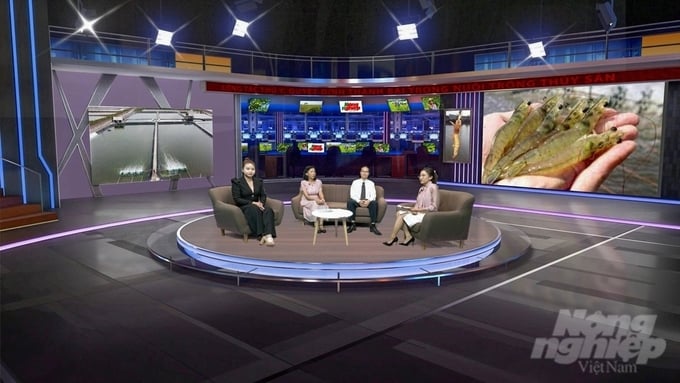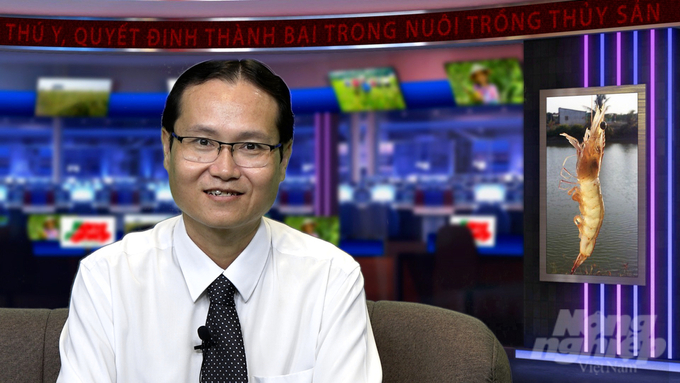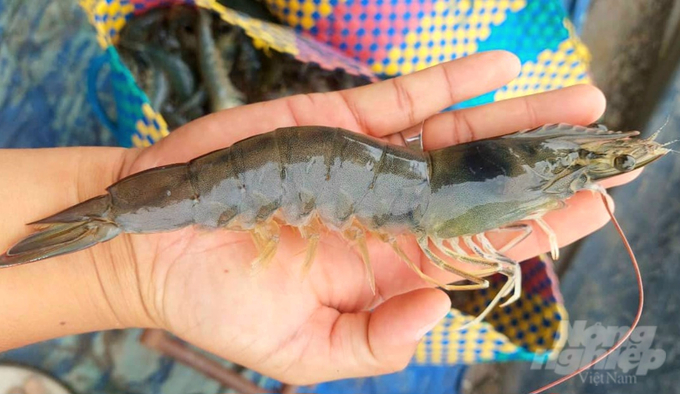November 24, 2025 | 13:08 GMT +7
November 24, 2025 | 13:08 GMT +7
Hotline: 0913.378.918
November 24, 2025 | 13:08 GMT +7
Hotline: 0913.378.918

Seminar on "Animal health activities determine success in aquaculture" organized by Vietnam Agriculture News. Photo: Kim Anh.
At the beginning of the 2023 shrimp crop, several Mekong Delta provinces recorded a delay in saltwater intrusion. Subsequently, shrimp farmers were forced to postpone their seeding schedule.
During the seminar on "Animal health activities determine success in aquaculture" organized by Vietnam Agriculture News, Mr. Tien Ngoc Tien, Director of the Sub-Department of Animal Health in Region VI, assessed that abnormal changes in the weather have affected many aspects of aquaculture, including shrimp farming.
On the other hand, the causative agents of white spot disease, acute hepatopancreatic necrosis disease, infectious hypodermal and haematopoietic necrosis virus are still present in various farming areas. As a result, the likelihood of disease outbreak on the 2023 shrimp crop is extremely high.
According to Mr. Tien, there have been several reports of dangerous diseases in shrimp farming areas across the Mekong Delta Region. The World Organization for Animal Health classify the following as dangerous diseases: white spot disease, acute hepatopancreatic necrosis disease, infectious hypodermal and haematopoietic necrosis virus. Through active surveillance, the Sub-Department of Animal Health in Region VII discovered other pathogens such as Microsporidian and pathogens capable of causing white feces syndrome.
The Sub-Department of Animal Health in Region VII oversees five key shrimp farming provinces including Ca Mau, Kien Giang, Bac Lieu, Soc Trang and Tra Vinh. The animal health sector collected over 17,000 samples from these provinces in 2022; at least 1,500 of those samples tested positive for the aforementioned diseases. Accordingly, Mr. Tien emphasized that multiple dangerous diseases on shrimp are currently circulating in farming ponds across the region.

Mr. Tien Ngoc Tien, Director of the Sub-Department of Animal Health in Region VI, assessed that the likelihood of disease outbreak on the 2023 shrimp crop is extremely high. Photo: Kim Anh.
In response to the challenge, Mr. Tien Ngoc Tien offered several solutions at the seminar. He recommended shrimp farmers to closely monitor weather forecasts and environmental monitoring alerts to promptly deal with abnormalities that may arise during shrimp farming.
Additionally, farmers were advised to renovate their ponds, control and treat input water to ensure a pathogen-less source of water. Most importantly, farmers should only buy disease-free shrimp seed with transparent origin from reputable establishments.
Mr. Tien requested seed production facilities to comply with regulations to create healthy shrimp seed. Furthermore, these facilities need to establish disease-free shrimp production zones and refrain from selling infected shrimp to farmers.
Farmers and shrimp seed production facilities are recommended to coordinate in the surveillance of disease on shrimp. When shrimps are detected with symptoms of infectious diseases, both parties must immediately notify animal health agencies and the local government for timely instructions, avoiding the spread of pathogens into the environment.
The Prime Minister recently issued Decision No. 434/QD-TTg approving the National Plan for prevention and control of dangerous diseases on aquacultural products from 2021 to 2030. Accordingly, a number of solutions were proposed to control diseases in aquaculture.
Local governments are actively implementing this decision. Additionally, they are promoting passive and active surveillance to detect and promptly control outbreaks as well as the circulation of pathogens.

Farmers and shrimp seed production facilities are recommended to coordinate in the surveillance of disease on shrimp; thereby, preventing the spread of pathogens into the environment. Photo: Kim Anh.
Moreover, local governments have strengthened quarantine activities, control the circulation and transport of shrimp seed, aquacultural products capable of carrying pathogens. Imported shrimp seeds are subject to strict quarantine with the goal of quickly detecting and handling pathogens. Mr. Tien believes that it is important to establish a biosafe farming process, which is one of the most effective solutions for disease prevention in shrimp.
There are currently 28 recognized disease-free establishments for shrimp production across the country, including 25 shrimp seed production facilities and 3 commercial shrimp farms. Key shrimp farming provinces in the Mekong Delta region that are under the management of Sub-Department of Animal Health in Region VII have recognized 10 establishments as disease-free, including 7 shrimp seed production facilities and 3 commercial shrimp farms.
Shrimp seed production facilities and commercial shrimp farms have actively implemented the construction of disease-free facilities over the last few years. Despite the fact that disease-free shrimp seed facilities are a crucial foundation to help shrimp farmers avoid infected shrimp seed, their number is limited compared to demand.
Translated by Nguyen Hai Long
/2025/11/22/4018-4-213342_747.jpg)
(VAN) The Mekong Delta Agricultural Experts Club has attracted 143 experts and researchers to participate in providing consultancy and contributing initiatives to the development of one million hectares of high-quality rice.

(VAN) Ca Mau’s development of OCOP products opens a path to increasing cooperatives value, helping boost income, expand markets, and affirm collective economy's role.

(VAN) Turning seemingly ordinary coconut shells into unique jewelry and artwork, Nguyen Bang Nhi spreads the value of local culture through her brand, Cocohand.

(VAN) Results from the Sustainable Durian Model Project in Dak Lak have confirmed the critical role of Yara Viet Nam in transferring advanced nutritional solutions to farmers.

(VAN) In Tuyen Quang province, livestock farmers have introduced effective models and innovative practices that significantly strengthen African Swine Fever prevention and control efforts.

(VAN) This is the study conducted by IRRI and Can Tho University on the rice straw value chain in Mekong Delta showing an economic potential of more than 6.6 trillion VND/year.

(VAN) By participating in cooperative economics, many farmers in Tay Ninh have overcome hardship, mastered clean dragon fruit cultivation techniques.